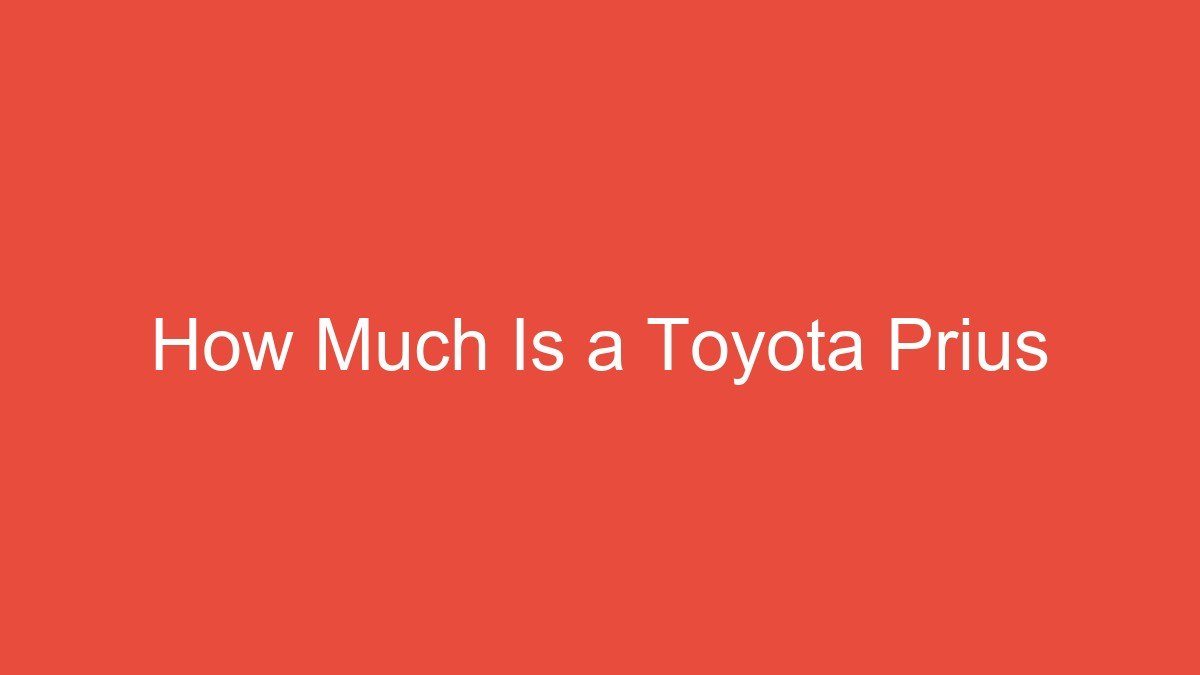
Contents
- How Much Is a Toyota Prius? Your Ultimate Guide to New & Used Prices
- FAQ
How Much Is a Toyota Prius? Your Ultimate Guide to New & Used Prices
Ah, the Toyota Prius! It’s a name synonymous with fuel efficiency, reliability, and eco-conscious driving. If you’re considering joining the ranks of hybrid owners, one of the first questions on your mind is undoubtedly: “How much is a Toyota Prius?“
It’s a fantastic question, and one without a single, simple answer. The cost of a Prius can vary significantly depending on whether you’re looking at a brand-new model fresh off the lot or a pre-owned gem, as well as factors like trim level, features, and even your location.
But don’t worry! This friendly guide is here to help you unpack all the costs involved. We’ll walk you through what to expect for new and used models, discuss the hidden costs of ownership, and provide valuable tips to help you snag the best deal.
🛒 Recommended Product
The Cost of a Brand-New Toyota Prius
When you’re eyeing a shiny new Prius, you’re investing in the latest hybrid technology, advanced safety features, and a full manufacturer’s warranty. The price typically reflects these cutting-edge innovations.
While exact prices fluctuate with market demand, manufacturer incentives, and model year updates, here’s a general breakdown of what influences the sticker price:
-
MSRP (Manufacturer’s Suggested Retail Price): This is the starting point for any new vehicle. For a Toyota Prius, you can expect the MSRP to generally range from around $28,000 for the base model to upwards of $37,000 for top-tier trims (excluding destination charges, taxes, and optional features).
-
Trim Levels: Toyota offers various trim levels for the Prius, each building upon the last with more features, comfort, and technology.
- Base Models: These provide the core Prius experience – excellent fuel economy and essential features – at the most accessible price point.
- Mid-Range Trims: These add desirable upgrades like larger infotainment screens, enhanced interior materials, more advanced driver-assistance features, and sometimes all-wheel drive (AWD) options, naturally increasing the price.
- Premium Trims: These are fully loaded with luxury touches, advanced connectivity, premium audio systems, and the most comprehensive safety suites, pushing the price towards the higher end of the spectrum.
-
Optional Features & Packages: Beyond trim levels, you can often add individual options or packages. These might include:
- Special paint colors
- Roof racks or other utility accessories
- Upgraded wheel designs
- Enhanced connectivity services
- Advanced navigation systems
Each added option will incrementally increase the total cost.
-
Destination Fee: This is a non-negotiable charge from the manufacturer to transport the vehicle from the factory to the dealership. It’s usually a few hundred dollars and is added to the MSRP.
-
Taxes, Title, and Registration: These are state and local fees that vary significantly by location. Always factor these into your budget as they can add thousands of dollars to the final purchase price.
Step-by-Step for Estimating a New Prius Price:
- Determine Your Must-Haves: What features are non-negotiable for you (e.g., AWD, specific safety tech, a certain interior style)?
- Research Current Model Year Trims: Visit the official Toyota website or reputable automotive review sites to see the available trims and their standard features for the current model year. This will give you a good starting MSRP range.
- Consider Optional Extras: Look at the available packages and accessories for your desired trim. Add these costs to get a more accurate total.
- Calculate Local Fees: Use online tax and registration calculators specific to your state or ask a local dealership for an estimate.
The Cost of a Used Toyota Prius
Opting for a used Toyota Prius can be an excellent way to save money while still enjoying the benefits of hybrid ownership. The Prius is known for its exceptional reliability and strong resale value, meaning a well-maintained used model can serve you faithfully for many years.
The price of a used Prius is highly dependent on several factors:
- Model Year: Newer used models (1-3 years old) will be closer to new car prices but offer significant savings from the initial depreciation hit. Older models (5+ years old) will be considerably more affordable.
- Mileage: Generally, lower mileage equals a higher price. However, Priuses are known for their longevity, so a higher-mileage example might still be a great deal if it’s been well-maintained.
- Condition: The overall physical and mechanical condition of the car (interior, exterior, engine, hybrid battery) plays a huge role. A well-preserved car will command a higher price.
- Trim Level & Features: Just like new cars, a used Prius with a higher original trim level or desirable optional features (like navigation or advanced safety tech) will be more expensive than a base model from the same year.
- Location: Prices can vary regionally based on demand and supply.
- Seller Type: You might find slightly lower prices from private sellers compared to dealerships, but dealerships often offer warranties and certified pre-owned (CPO) options for peace of mind.
General Used Prius Price Ranges (Approximate):
- 1-3 Years Old: Expect to pay $20,000 – $32,000+, depending heavily on trim and mileage. These often still have remaining factory warranty.
- 4-6 Years Old: Generally in the $15,000 – $25,000 range. A great sweet spot for value.
- 7-10+ Years Old: You can find these for under $15,000, sometimes even under $10,000, especially if they have higher mileage. Be sure to get a thorough inspection for these older models.
Step-by-Step for Finding a Used Prius Price:
- Define Your Budget: How much are you realistically comfortable spending?
- Identify Your Desired Model Year & Mileage Range: What’s your ideal balance between age, mileage, and price?
- Browse Online Marketplaces: Check major used car websites (mentioning specific sites is against the rules, but you know which ones we mean!). Filter by year, mileage, and location.
- Compare Prices: Look at several listings for similar vehicles to understand the market value. Don’t just look at the lowest price; compare condition and features.
- Get a Vehicle History Report: For any serious contender, invest in a vehicle history report (like CARFAX or AutoCheck) to check for accidents, service history, and title issues. This is critical!
- Schedule a Pre-Purchase Inspection (PPI): Before buying, especially from a private seller, have an independent mechanic inspect the car. This small investment can save you thousands down the line, especially with hybrid battery health.
Beyond the Sticker Price: The True Cost of Prius Ownership
The purchase price is just one piece of the puzzle. When budgeting for any car, it’s essential to consider the total cost of ownership. Here’s how the Prius generally stacks up:
- Fuel Savings: This is where the Prius shines! Its exceptional fuel economy (often 50 MPG combined or more) means you’ll spend significantly less at the pump compared to conventional gasoline cars. Over years of ownership, these savings can offset a portion of the initial purchase price.
- Insurance: Insurance costs vary based on your age, location, driving record, and the specific model year/trim. However, the Prius’s strong safety ratings and lower repair costs for common accidents can sometimes lead to more favorable insurance premiums.
- Maintenance: Toyota vehicles are renowned for their reliability and low maintenance costs. Routine maintenance is standard, and while hybrid components (like the battery) can be expensive to replace, they are designed to last for the life of the vehicle and often come with long warranties (typically 8 years/100,000 miles, in some states even 10 years/150,000 miles).
- Registration & Taxes: These are ongoing annual fees that vary by state.
- Depreciation: While all cars depreciate, the Toyota Prius is known for its excellent resale value. This means it holds its value better than many competitors, which can be a significant benefit if you decide to sell or trade it in later.
Tips for Finding the Best Prius Deal
Ready to start your search? Here are some friendly tips to help you get the most for your money:
- Research Thoroughly: Knowledge is power! Understand the different trims, features, and common price ranges for both new and used models before you even step foot in a dealership.
- Test Drive Everything: Don’t just test drive the one you think you want. Try different trims, and if buying used, drive a few different examples to compare. Comfort and feel are crucial.
- Be Prepared to Negotiate: Whether new or used, there’s almost always room for negotiation, especially on the final price, trade-in value, and financing rates. Don’t be afraid to walk away if the deal isn’t right.
- Consider Off-Peak Times: Car shopping at the end of the month, quarter, or year can sometimes yield better deals as dealerships try to hit sales targets.
- Get Pre-Approved for Financing: Secure financing from your bank or credit union before visiting a dealership. This gives you a stronger negotiating position and a benchmark interest rate.
- Separate Trade-In Negotiation: If you have a trade-in, negotiate the price of the Prius first. Then, discuss your trade-in as a separate transaction.
- Explore Certified Pre-Owned (CPO): For used models, a Toyota Certified Used Vehicle (TCUV) Prius offers the peace of mind of a multi-point inspection, extended warranty, and roadside assistance, often for a slightly higher price than a non-CPO used car.
Common Mistakes to Avoid When Buying a Prius
Even with the best intentions, it’s easy to fall into common car-buying traps. Here’s what to watch out for:
- Skipping the Test Drive: You might love the idea of a Prius, but you need to experience how it drives and feels to you. Don’t buy based solely on online research.
- Not Researching the Total Cost of Ownership: Focusing only on the sticker price can lead to budget surprises later. Always factor in insurance, maintenance, and fuel savings.
- Ignoring a Pre-Purchase Inspection (for Used Cars): This cannot be stressed enough. Always get an independent mechanic to inspect a used car before you buy it. It’s the best way to uncover hidden issues.
- Falling for Pressure Tactics: High-pressure sales tactics are designed to rush you into a decision. Take your time, ask questions, and don’t be afraid to say no.
- Not Reading the Fine Print: Before signing anything, carefully read the entire purchase agreement, financing terms, and warranty information.
- Overlooking Hybrid Battery Health (for Older Used Models): While durable, the hybrid battery is the most expensive component. Ensure it’s been well-maintained and consider its warranty status, especially on older models.
Conclusion: Is a Toyota Prius Worth the Cost?
When you ask, “How much is a Toyota Prius?” you’re really asking about its value. And for many drivers, the Prius offers an unbeatable combination of fuel efficiency, legendary reliability, low running costs, and strong resale value, making it a very smart investment in the long run.
🛒 Recommended Product
Whether you opt for a cutting-edge new model or a tried-and-true used version, a Toyota Prius can deliver years of economical and environmentally friendlier driving. Armed with this guide, you’re now well-equipped to navigate the market and find the perfect Prius at the right price for you! Happy car hunting!
FAQ
Q. What is the average starting MSRP for a new Toyota Prius?
A. The starting Manufacturer’s Suggested Retail Price (MSRP) for a new Toyota Prius typically ranges from approximately $28,000 to $35,000, depending on the trim level and selected features. Higher trims like the Limited or AWD-e models will be at the upper end of this spectrum, or even exceed it slightly, before adding options, taxes, and fees.
Q. How much does a used Toyota Prius usually cost?
A. The price of a used Toyota Prius varies significantly based on its model year, mileage, condition, trim level, and location. Generally, you can expect to find used models ranging from $5,000 for older, higher-mileage examples (10+ years old) up to $25,000 or more for newer, low-mileage vehicles just a few years old that are still in excellent condition.
Q. Is the Toyota Prius Prime more expensive than the standard Prius?
A. Yes, the Toyota Prius Prime, which is a plug-in hybrid electric vehicle (PHEV), is generally more expensive than the standard hybrid Toyota Prius. Its MSRP typically starts a few thousand dollars higher due to its larger battery capacity and extended electric-only driving range capability.
Q. What factors most influence the price of a Toyota Prius?
A. Several key factors influence the price: the model year (newer generally costs more), trim level (e.g., LE, XLE, Limited), drivetrain (AWD-e models often cost slightly more than FWD), optional packages and features, mileage (lower mileage increases value), overall condition (interior, exterior, mechanical), and regional market demand.
Q. What are the typical monthly lease payments for a new Toyota Prius?
A. Monthly lease payments for a new Toyota Prius can vary significantly based on the specific model, trim, lease term (e.g., 24 or 36 months), annual mileage allowance, your credit score, and any down payment made. As a rough estimate, payments often fall within the range of $250 to $400+ per month, excluding taxes and fees, for popular trims.
Q. Does choosing an all-wheel-drive (AWD-e) version affect the price of a new Prius?
A. Yes, opting for the all-wheel-drive (AWD-e) version of the Toyota Prius typically increases its price. The AWD-e system adds a small electric motor to the rear axle, enhancing traction in various conditions but also adding to the vehicle’s manufacturing cost, which is reflected in a slightly higher MSRP compared to front-wheel-drive counterparts of the same trim level.
Q. How does the initial cost of a Prius compare to its long-term running costs?
A. While the initial purchase price of a Toyota Prius is competitive within its segment, its long-term running costs are notably low. The Prius is renowned for its excellent fuel efficiency, which saves significant money on gasoline over time. Maintenance costs are generally average for a Toyota vehicle, and its strong reliability contributes to lower unexpected repair expenses. Its strong resale value also helps offset the initial investment.
Related Articles
How Much Does a Tesla Cybertruck Cost
How Much Does a Tesla Cybertruck Cost? Your Ultimate Guide to Pricing & Purchase The Tesla Cybertruck has captured imaginations with its futuristi…
How Much Is a Tesla
How Much Is a Tesla? Unpacking the Cost of Your Dream EV Dreaming of driving a Tesla? You’re not alone! These innovative electric vehicles have …
Affiliate Disclosure: As an Amazon Associate, I earn from qualifying purchases made through links on this site.















